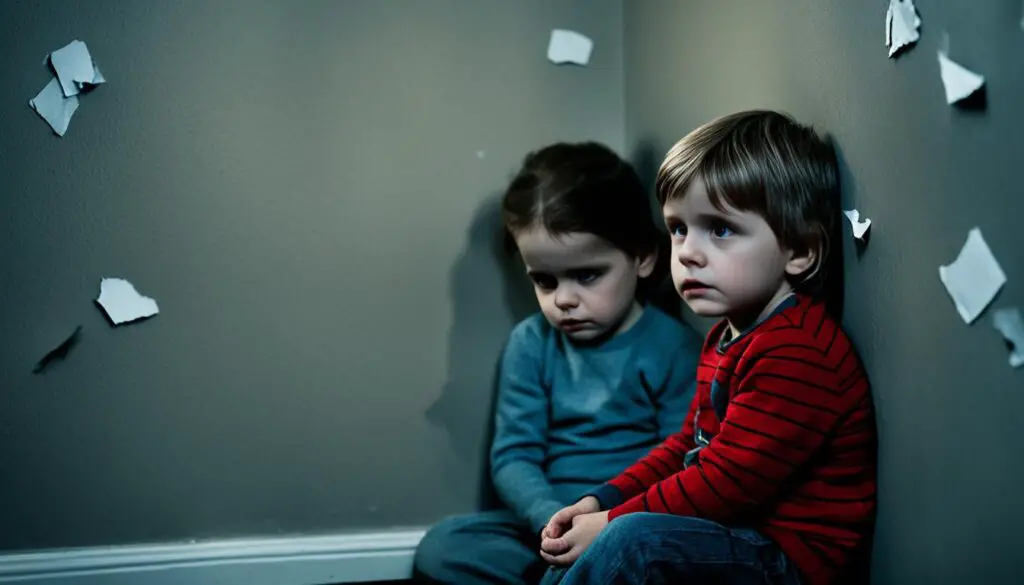Understanding the Effects of Childhood Trauma on Families
Childhood trauma can have profound and long-lasting effects on families. The impact of trauma on relationships and emotional health cannot be underestimated. The COVID-19 pandemic has shed light on the increased danger faced by families affected by trauma, particularly victims of domestic violence.
During the height of the pandemic, victims of domestic violence found themselves spending more time with their abusers and had limited access to resources. This situation intensified the effects of trauma on both parents and children, as they struggled with the stress and isolation caused by abuse.
The consequences of childhood trauma extend beyond the immediate experience. Millions of teenagers in the United States experience some form of dating violence, which can lead to disordered eating habits, mental health issues, and strained relationships with family and friends. The long-term effects of trauma can be debilitating, impacting individuals’ ability to form healthy relationships and maintain emotional well-being.
Key Takeaways:
- Childhood trauma can have profound and long-lasting effects on families.
- The COVID-19 pandemic has heightened the danger faced by victims of domestic violence.
- Dating violence can lead to disordered eating habits, mental health issues, and strained relationships.
- The long-term effects of trauma can impact an individual’s ability to form healthy relationships.
- Addressing childhood trauma and providing support is crucial for healing and building healthier lives.
The Ripple Effect of Childhood Trauma on Mental Health
Childhood trauma can have significant effects on mental health. Survivors of abuse often experience a range of mental health conditions, including depression, anxiety, post-traumatic stress disorder (PTSD), and substance abuse. The long-term impact of trauma can extend beyond the individual, affecting their family members as well.
Children who witness domestic violence, for example, are more likely to develop mental health issues and exhibit behavioral problems. The psychological consequences of childhood trauma can create a ripple effect, impacting multiple generations within a family. This intergenerational transmission of trauma can perpetuate a cycle of abuse, leading to further mental health challenges.
To address these profound mental health effects, it is crucial for survivors of childhood trauma to seek therapy and support. By seeking professional help, individuals can address the psychological consequences of their trauma and work towards breaking the cycle of intergenerational trauma within their families.

“The long-term impacts of childhood trauma on mental health can be far-reaching and affect not only the individual but also their loved ones. Seeking therapy and support is essential for addressing these psychological consequences and breaking the cycle of intergenerational trauma.”
Impact of Childhood Trauma on Interpersonal Relationships
Childhood trauma can have a profound impact on interpersonal relationships. Survivors of trauma often struggle with trust issues, have difficulty forming intimate connections, and may engage in unhealthy relationship patterns.
Trust is a fundamental aspect of any relationship, and individuals who have experienced trauma may find it challenging to trust others fully. The betrayal or violation they experienced during their traumatic event can create deep-seated trust issues that permeate their interactions with others.
Similarly, survivors may find it difficult to form intimate connections with others. Trauma can make it challenging to open up and be vulnerable, as survivors may fear being hurt or betrayed once again. This difficulty forming intimate connections can manifest in both platonic and romantic relationships, leading to feelings of isolation and loneliness.
The effects of trauma can also influence relationship dynamics and communication. Survivors may struggle with setting boundaries, as their traumatic experiences may have violated their personal boundaries in the past. Additionally, they may find it challenging to establish trust with others, leading to difficulties in healthy communication and conflict resolution.
The strain of trauma on interpersonal relationships extends beyond romantic partnerships. Familial relationships and friendships can also be impacted by the lasting effects of childhood trauma. Survivors may experience difficulties in trusting their family members or close friends, leading to strained relationships and a sense of distance.
It is important for survivors of childhood trauma to seek therapy and support to address these challenges and develop healthy relationship skills. Therapy can provide a safe space for survivors to explore their trust issues, develop effective communication strategies, and establish healthy boundaries.
Effects of Childhood Trauma on Interpersonal Relationships
| Effects | Description |
|---|---|
| Trust issues | Survivors may have difficulty trusting others, leading to strained relationships. |
| Difficulty forming intimate connections | Individuals may struggle to open up and be vulnerable, hindering the formation of close relationships. |
| Unhealthy relationship patterns | Survivors may engage in patterns such as codependency or avoidant behavior, impacting relationship dynamics. |
| Challenges in setting boundaries | Survivors may struggle to establish and maintain healthy boundaries in relationships. |
| Impaired communication skills | The effects of trauma can make it challenging to communicate effectively and resolve conflicts. |

Resources such as therapy, support groups, and trauma-informed care can provide survivors with the tools and support they need to address these challenges and develop healthy, fulfilling relationships.
Conclusion
Addressing childhood trauma is essential for promoting healing and providing support to trauma survivors. The far-reaching effects of trauma on families, mental health, and interpersonal relationships cannot be ignored. To help individuals and families recover from the impact of trauma, it is crucial to utilize resources such as therapy, support groups, and trauma-informed care.
Therapy plays a significant role in healing from trauma by providing a safe space for survivors to process their experiences, develop coping mechanisms, and rebuild their lives. Support groups offer a sense of belonging and solidarity, allowing trauma survivors to connect with others who have similar experiences and gain valuable insights from shared stories of resilience.
Implementing trauma-informed care across various sectors, such as education, healthcare, and social services, is essential in addressing the prevalence of childhood trauma. By raising awareness about trauma, providing education about its effects, and implementing prevention programs, we can work towards creating a society that prioritizes the well-being of trauma survivors.
Support for trauma survivors is crucial to their healing journey. Creating a network of resources and services that are accessible, inclusive, and trauma-informed is essential. By combining individual therapeutic interventions with community support, trauma survivors can find the necessary support and interventions to navigate their healing process, rebuild their lives, and create healthier and more fulfilling futures.
FAQ
What are the effects of childhood trauma on families?
Childhood trauma can have profound and long-lasting effects on families. It can lead to strained relationships, disordered eating habits, and mental health issues.
How does childhood trauma impact mental health?
Childhood trauma can lead to symptoms such as depression, anxiety, post-traumatic stress disorder (PTSD), and substance abuse.
What is the impact of childhood trauma on interpersonal relationships?
Childhood trauma can result in trust issues, difficulty forming intimate connections, and unhealthy relationship patterns.
How can we address the effects of childhood trauma?
It is crucial to provide support for trauma survivors through therapy, support groups, and trauma-informed care to promote healing and break the cycle of trauma.






